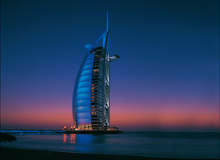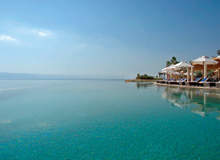
Dubbed “Las Vegas-by-the-sea” by those who appreciate its glamour, whatever
doesn’t come naturally to Dubai is simply created from scratch –
from shopping malls, theme parks and marinas, there is no stopping the
development of this UAE emirate. More than 86,000 hotel rooms are scheduled to
be built between 2010 and 2016, while occupancy rates have been steadily
increasing, averaging 84.6% in 2005, up from 81% the previous year.
Familiar names such as Four Seasons, Mövenpick and InterContinental are
bringing stiff competition to the hospitality sector. W Hotels unveiled plans
to open a new hotel on the Palm Jumeirah in late 2009, while the Rezidor Hotel
Group’s Regent Dubai Canal Point, which will offer 250 rooms and 185
serviced apartments, is due to open in 2010. Donald Trump, with Al Nakheel
Properties, is developing the Palm Trump International Hotel and Tower, a
48-storey mixed-use condo-hotel and residence with a 300-room five-star hotel
and 360 freehold residential apartments.
The 321m-tall, seven-star Burj Al Arab hotel, recognisable from its
distinctive sail shape, is still at the forefront of hospitality in Dubai.
General manager Luc Delafosse says: “One of the hotel’s founding principles
is delivering outstanding personal service.”
Since the hotel opened in 1999, it has enjoyed extremely high occupancy
levels. To ensure that high service levels are maintained, the ratio of staff
to guests has increased, and it is opening a new restaurant and refurbishing
its existing facilities.
CONSTANT REINVENTION
See Also:
The Dubai hospitality industry’s ability to constantly rejuvenate
itself is the key to the emirate’s ongoing appeal. Baerbel Kirchner,
director of Dubai Department of Tourism and Commerce Marketing’s UK and
Ireland office, says: “The growth in visitors is the result of the hotel
operators adding to their existing properties in Dubai with luxury
self-catering apartments and boutique hotels.”
How well do you really know your competitors?
Access the most comprehensive Company Profiles on the market, powered by GlobalData. Save hours of research. Gain competitive edge.

Thank you!
Your download email will arrive shortly
Not ready to buy yet? Download a free sample
We are confident about the unique quality of our Company Profiles. However, we want you to make the most beneficial decision for your business, so we offer a free sample that you can download by submitting the below form
By GlobalDataPam Wilby, general manager of the Grosvenor House and Le Royal Meridien,
sums up her vision of Dubai’s appeal: “Dubai is an aspirational
destination. It is constantly reinventing itself, so for those who have already
visited Dubai, there is always a new experience.”
Whereas Dubai was once known solely for its extravagance – indoor snow
domes, a month-long shopping festival and a hotel that ferries guests via
gondola, for example – it has now embraced low-key luxury. “The demand
for opulence has softened,” says Cheryl Gurner, managing director for Bathrooms
International, which has supplied bathrooms to top hotel projects such as the
Burj Al Arab and the Marriott. “Gold fittings are still in demand, but nickel
and chrome are becoming equally popular. The main difference is in the detail,
with hand-painted finishes and stonework.”
The Park Hyatt Dubai, which opened in 2005 on the banks of Dubai Creek,
combines Arabian architecture with soft lighting, white marble flooring and
dark wooden furniture.
A more minimalist approach can be found at the Grosvenor House, with its
neutral colour schemes and contemporary furniture. Located on the Dubai Marina,
this aparthotel’s mix of rooms and furnished apartment suites proved so
successful that, after just six months in operation, plans were drawn up to
extend the property. Work on Grosvenor House The Residence began in January
2007. Once completed, it will have 288 furnished suites, five villas, two new
restaurants and a health club.
SERVICE ETHOS
At the heart of the hotel’s ethos is the assumption that business
travellers want a home from home. “Both Grosvenor House and Le Royal Meridien
have loyal repeat customers,” says Wilby. “People are made to feel special.
They say it’s like coming to a real family hotel.”
Grosvenor House marketing director Jaideep Bhatia explains the secret behind
creating this community atmosphere: “Our people are our biggest asset. It is
the passion and attitude of our staff that ensure impeccable guest service. We
try to attract the best people and develop their skills.”
Fresh talent is essential, according to Lars Eltvik, senior lecturer and
marketing manager with the Emirates Academy. He says: “With the fast
development of Dubai, there is growing demand for quality candidates. Around
two-thirds of our students will stay after they have graduated, having been
hired as management trainees or middle management.”
The academy was founded in 2001 and offers degree-level courses focusing on
hospitality and tourism. The students are immersed in the hospitality industry.
The Burj Al Arab, the Madinat Jumeirah and other hotels are a short walk away,
and from early on in their degrees, students gain hands-on experience.
TRANSPORT INITIATIVES
Dubai plans to underpin its hospitality sector success by developing its
transportation infrastructure. A monorail system will be operational by
December 2008, and the $4.1bn expansion of Dubai International Airport will
enable it to handle 60 million passengers a year by 2010.
By building libraries and areas such as Media City alongside landmark
residential and commercial projects, Dubai is displaying its long-term
development goals. A further example of this is Dubai’s plan to become
the sports capital of the Gulf by the creating a Sports City, with a view to
winning the 2020 Olympic Games.
Dubai is widening its demographic by seeking to attract families, as well as
business people and those on luxury breaks, by offering reasonably priced hotel
accommodation during the summer low season.
“Dubai is building hotels and resorts that go way beyond just hospitality,
such as offering superb facilities in health tourism,” concludes Delafosse.
“Dubai has, without question, positioned itself as the greatest tourist
destination in the world.”




